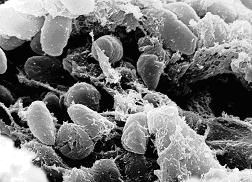Anyone who says genetically modified foods are harmless is
not paying attention to biology.
Just like their fingerprints, no two people have the exact
set of genetic materials. Most of the variations and innocuous, like eye or
skin color, hair texture, all these small differences that give each of us our
unique looks and personality.
Some of these genetic differences create no apparent
difference whatsoever between two people. But these differences CAN show up later when the
environmental conditions change. One specific set of apparently irrelevant
genes in a person may allow that person’s white blood cells to react more
quickly when an unknown chemical somehow enters our food supply. Whereas those
individuals who lack that gene get sick, those few individuals who possess that
odd, rare gene live better.
We
humans don’t change very rapidly. Malaria became a serious disease for the
human race long ago. It took a while, but over thousands of years, some evolved
immunity to it.
It
took as much as 20 generations, hundreds of years, for humans to evolve light
skin and blond hair. Those changes were driven by an ongoing need to absorb
more UV radiation from the sun to make sufficient Vitamin D as we moved into
higher latitude with reduced sunlight.
Eventually, only people with that useful genetic trait may
exist in the world, or a large region of it, the others having been very slowly
eliminated from or reduced in the gene pool. This is not meant to be cruel or
racist; it’s why our world is populated with the tremendous variety of people
we have today. Those of our ancestors whose bodies could better cope with, say,
the Yersinia pestis bacteria or the H1N1 flu virus survived the Bubonic Plague in the
mid-14th century and the Spanish Flu pandemic of 1918.
Yersinia pestis bacteria H1N1 flu
virus
People
who had within their genetic makeup an extra resistance to either that
bacterium or that virus survived. Those that didn’t, died, and ended their
genetic line. Such genetic mutations occur slowly and randomly in humans, and
are then passed to the offspring of those who possess it. We can’t do much to
either speed it up or stop it from happening.
Bacteria
generate random mutations in theior genetic makeup much more rapidly then we
humans do. And bacteria, and for that matter viruses, have an extra “genetic”
trick we humans lack: they can swap genes. And I don’t mean to mix their genes
in their offspring, as we do every time we make a baby. A living bacterium can
amble up to a complete stranger bacterium and exchange genes. Each one tends to
offer up what seems to be most effective in the environment they currently live
in.
So
if, by mutation or ay other means, a single bacterium develops resistance to,
say, an overused antibiotic drug, chemical, or a genetic change on a species
they prey on, they can quickly pass that on to all their neighbors, who pass it
on to their neighbors, and so on. In a relatively short period of time, virtually
all the bacteria which haven’t already died from exposure to the antibiotic or
chemical are immune to it. We have created superbugs.
All
living things evolve over time in the sense that their exact genetic makeup
changes. It seems that the more complex the creature, the slower this process
is.
So
what is the point of all of this? Simple. If we rapidly change our environment,
because of widespread and heavy use of drugs, chemicals or even genetically
altering our food sources, we will trigger a massive “biological war” with the
bacteria, insects and weeds that already attack us or our crops, just as
occurred naturally when bacteria exchanged genes and became resistant to
penicillin. We are forcing pests to become superbugs, super weeds, etc. Genetically
modifying our crops will, in the long run, make life miserable for us humans,
just as antibiotics eventually created bacteria and viruses we can’t defeat.
Are
you listening, Monsanto?



No comments:
Post a Comment